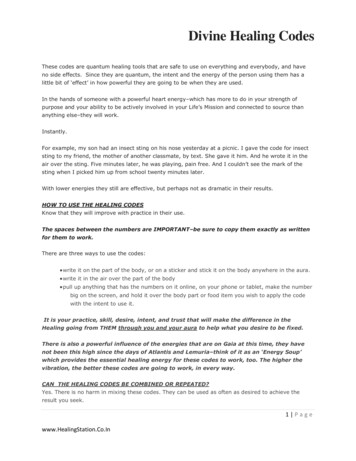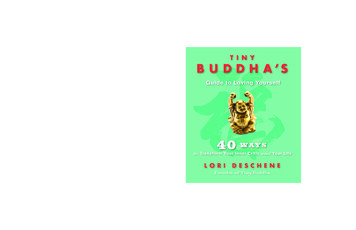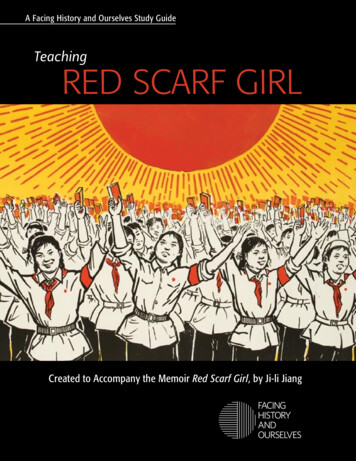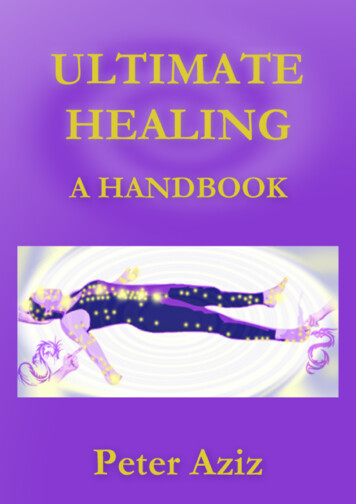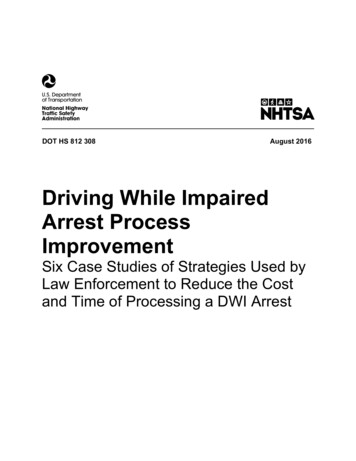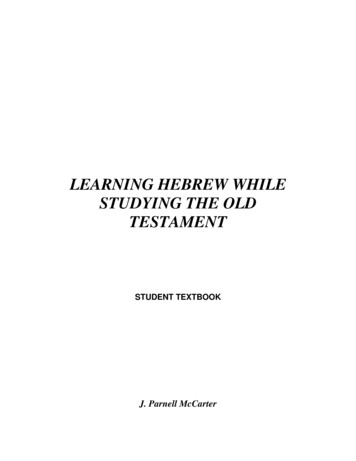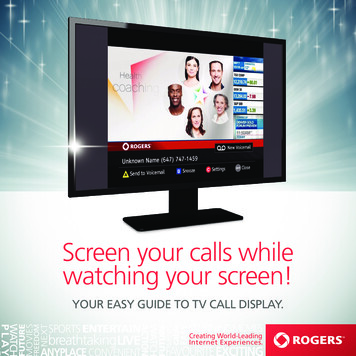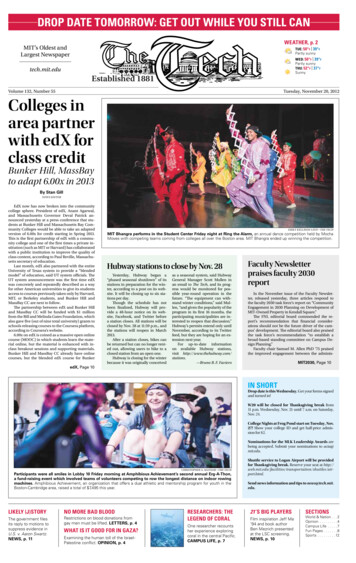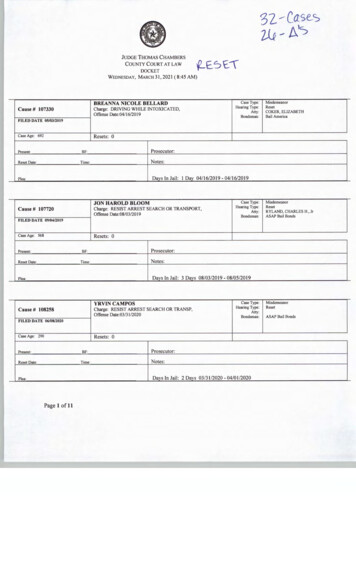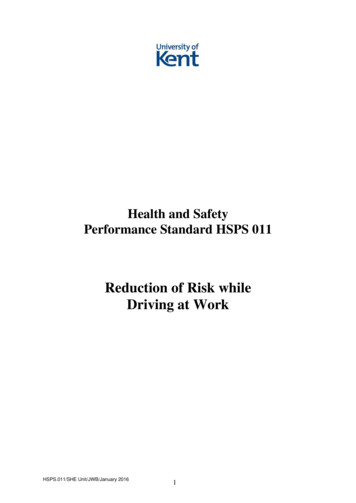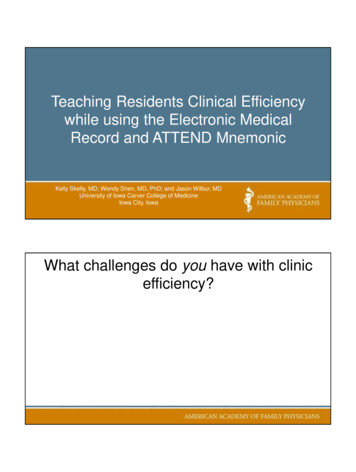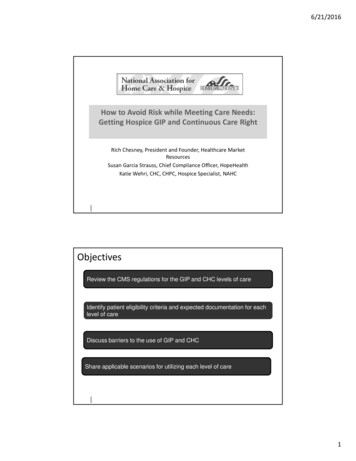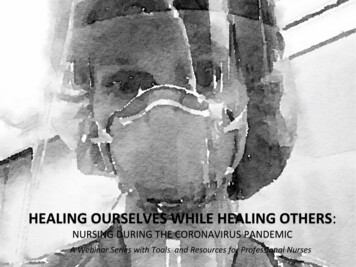
Transcription
HEALING OURSELVES WHILE HEALING OTHERS:NURSING DURING THE CORONAVIRUS PANDEMICA Webinar Series with Tools and Resources for Professional Nurses
Donna Gaffney, DNSc, PMHCNS-BC, FAANMilagros Elia, APRN-BCAnne Hofmeyer, PhD, MPHC, RN, MACNPeg Pipchick, PhD, APN
Donna Gaffney, DNSc, PMHCNS-BC, FAANDonna is a psychotherapist, author and educator, has longaddressed a wide range of life-altering experiences in thelives of children and families—loss, trauma, and stress. Shehas counseled professionals, young people and schools inthe aftermath of individual and national tragedies — 9/11,Sandy Hook, and Hurricane Katrina. In addition to academicpapers, Donna is the author of The Seasons of Grief, HelpingChildren Grow Through Loss. She taught at ColumbiaUniversity and holds master’s degrees from TeachersCollege, Columbia University; Rutgers University, and adoctorate from the University of Pennsylvania. Her postdoctoral work includes the Prudential Fellowship for Childrenand the News at Columbia Journalism School. Donnaconsults for the New York Life Foundation and the ResilientParenting for Bereaved Families Program at Arizona StateUniversity.Anne holds an Adjunct appointment with the SONM and isa Visiting Professor at Anglia Ruskin University,Cambridge, UK. She is a member of the Royal College ofNursing (RCN) UK and Australian College of Nursing. Hercurrent research is on translating the social neuroscienceof empathy and compassion in the context of culture,networks and leadership in nursing and healthcare. Anneholds a PhD and a Master’s Degree in Primary Health Care(palliative care specialty) from Flinders University,Australia. Following completion of her PhD in 2002, shewas recruited to the Faculty of Nursing, University ofAlberta, Canada in 2003. In 2004, she completed anIntensive Bioethics Course at the Joseph P. & Rose F.Kennedy Institute of Ethics, Georgetown University,Washington DC.Anne Hofmeyer, PhD, MPHC, RN, MACNMilagros Elia, APRN-BCMillie is the founder of M. Elia Wellness offeringservices in Integrative health program design withinlocal cancer survivorship communities, as well aslarger healthcare systems and organizations bothNationally and Internationally. She is the proudrecipient of the (SIO) Society for Integrative Oncology's2019 Clinician Stakeholder Award for the impact herservices have had and continue to have on the cancersurvivorship community. She has twenty years ofexperience as a Nurse Practitioner and received herMasters of Arts from NYU in Advanced PracticeNursing and is a certified health and wellness coach.Peg is an Advanced Practice Psychiatric Nurse and licensedMarriage and Family Therapist. She works with children,individuals and families to help them become more aware ofthemselves and others through talking and experiencingtheir feelings. As a Disaster Crisis Counselor and therapist,Peg has counseled individuals after 9/11, hurricanes Rita,Floyd and Sandy. Peg has served as Adjunct Faculty andGuest lecturer in several nursing programs and taught familytherapy at Drew University. As a facilitator for the Recoveryand Monitoring Program (RAMP), Institute for Nursing, Peghelped nurses whose practice was impaired by drugs, alcoholor other issues. She has a Masters of Arts from NYU inPsychiatric Nursing, is a Graduate of Blanton-Peale GraduateInstitute and earned a PHD from Union Institute andUniversity. Peg has a private practice in Cranford, NJ and is aCertified Holotropic Breathwork Facilitator.Peg Pipchick, PhD, APN
Welcoming Self-Compassion,Finding Support and Self-Care
GOALS . . . Identify your ability to provide SelfCompassion Locate support in your work & personallives Recognize toxicity in relationships andenvironments. Identify and practice mind-body self-carestrategies
Identify your ability to provide Self-Compassion
What is self-compassion?
Self-Compassion as a Self-Care Strategy (Neff,2003)Positively correlated with:Negatively correlated with: Initiative Self-criticism Life satisfaction Thought suppression Emotional intelligence Social connection Perfectionism Optimism Anxiety Positive affect Rumination Happiness
Why is this important in Nursing?Photo: National Cancer Institute
Locate support in your work and personal lives
Recognize toxicity in relationships and environments
FINDING YOUR SELF-CARE STRATEGIESPhoto: Jyotirmoy Gupta
Think back to your childhood—what made you feel better whenyou were sick or sad or lonely? (aplace, story, person, food,activity. . .)List your responses. At least 3 to 5things that gave you comfort.1.2.3.4.5.Art: LAirriess
Think about the last time youwere upset, stressed out, sad, orjust plain out of sorts!List 3-5 things that give youcomfort NOW (a book, person,music, poem, movie, song . . .)1.2.3.4.5.Art: LAirriess
Take a few moments to finish eachside of the paper—as a child andnow as an adult.Look at both lists. Think about thesimilarities in your self-careactivities — as a child and as anadult.How OFTEN do you practice selfcare. . . .In the past 2 days?The past week?Past two weeks?Past month?Photo: DGaffney, Ice cream makes everything better
Time to Breathe and Stretch
Questions?
BIBLIOGRAPHYBauer-Wu, S., & Fontaine, D. (2015). Prioritizing clinician wellbeing: University of Virginia’scompassionate care initiative. Global Advances in Health and Medicine, 4(5). 16–22.Boellinghaus I., Jones F.W., Hutton J. (2014). The role of mindfulness and loving-kindnessmeditation in cultivating self-compassion and other-focused concern in health careprofessionals. Mindfulness, 5, 129-138.Carter, S. (2011, August 7). The Hidden Health Hazards of Toxic Relationships. High Octanewomen. Psychology c-relationshipsDuhigg, C. (2016). What Google learned from its quest to build the perfect team. The New YorkTimes Magazine, 26, 2016.Germer, C., & Neff, K. (2019). Teaching the mindful self-compassion program: A guide forprofessionals. Guilford Publications.Healing Circles Global. (n.d.). Getting Started. Bringing the Power of Healing Circles to Nursesand Health Providers. https://healingcirclesglobal.org/nursing/
Neff K. (2003). The Development and Validation of a Scale to Measure Self-Compassion. Self& Identity, 2, 223.Neff, K. (2011). Self-compassion: The proven power of being kind to yourself. New York:Harper Collins Publishers.Neff K.D. (2016). The Self-compassion Scale is a valid and theoretically coherent measure ofself-compassion. Mindfulness, 7, 264-274.Levenson, R. W., Ekman, P., & Ricard, M. (2012). Meditation and the startle response: A casestudy. Emotion, 12(3), 650.Mills J., Wand T. Fraser J.A. (2015). On self-compassion and self-care in nursing: Selfish oressential for compassionate care? Int J Nurs Stud, 52, 791-793.Mills J., Wand T. Fraser J.A. (2017a). Palliative care professionals' care and compassion for selfand others: a narrative review. Int J Palliat Nurs, 23, 219-229.Nelson, J. R., Hall, B. S., Anderson, J. L., Birtles, C., & Hemming, L. (2018). Self–compassion asself-care: A simple and effective tool for counselor educators and counselingstudents. Journal of Creativity in Mental Health, 13(1), 121-133.Soloman, A. (2017, May 24) . The case for taking a break. ANA.Nurse Focus, /
tion-why-and-how3144782?utm source emailshare&utm medium social&utm campaign /blogs/9/38
Let us know how you are doing!HealingOurselves@DonnaGaffneyDNSc.com
Children Grow Through Loss. She taught at Columbia University and holds master’s degrees from Teachers College, Columbia University; Rutgers University, and a doctorate from the University of Pennsylvania. Her post - doctoral work includes the Prudential Fellowship for Children and the N
